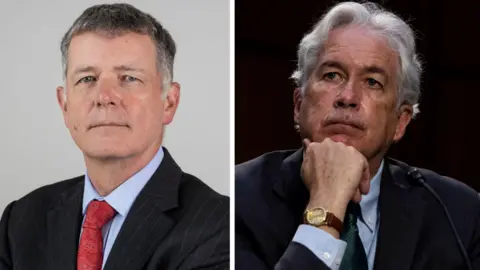The international world order is "under threat in a way we haven’t seen since the Cold War", the heads of the UK and US foreign intelligence services have warned.
The chiefs of MI6 and the CIA also said both countries stand together in "resisting an assertive Russia and Putin's war of aggression in Ukraine".
In a first-ever joint article, Sir Richard Moore and William Burns wrote in the Financial Times that they saw the war in Ukraine coming "and were able to warn the international community", in part by declassifying secrets to help Kyiv.
And they said there was work being done to "disrupt the reckless campaign of sabotage" across Europe by Russia, push for de-escalation in the Israel-Gaza war, and counterterrorism to thwart the resurgent Islamic State (IS).
"Successfully combating this risk" is at the foundation of the special relationship between the UK and US, they added.
One of the "unprecedented array of threats" faced by both countries is the war in Ukraine, which is in its third year after Russia's invasion in February 2022.
 gov.uk / Reuters
gov.uk / ReutersDetails of the speakers were kept under wraps until just minutes before they arrived on stage. They appeared relaxed together and stressed the close working partnership between their agencies.
Mr Burns told attendees that Ukraine's recent seizure of Russian territory in the Kursk region was a "significant tactical victory", but he saw no evidence that Russian President Vladimir Putin's grip on power was weakening.
There have been calls from Ukraine for the West to supply more weapons and lift restrictions on their use inside Russia.
The failure to do so has sometimes been put down to fears over how Moscow might react. But the spy chiefs suggested that should not deter support for Ukraine.
"None of us should take lightly the risks of escalation," Mr Burns said.
He described a moment in late 2022 when there was, he said, a "genuine risk" of the potential use of tactical nuclear weapons by Russia in response to setbacks on the battlefield.
Mr Burns passed messages to Russian officials warning of the consequences of their use.
"I’ve never thought, however - and this is the view of my agency - that we should be unnecessarily intimidated by that," the CIA Director continued.
"Putin’s a bully. He’s going to continue to sabre rattle from time to time."
Asked about an apparent increased willingness of Russian intelligence services to carry out covert operations like sabotage and arson in Europe, Sir Richard Moore said their use of criminals to carry out attacks suggested a degree of desperation.
"Russian intelligence services have gone a bit feral in some of their behaviour," he said.
Mr Burns added that even if plots sometimes appeared amateurish, they could still be "reckless and dangerous".
In their joint piece for the FT newspaper, both men said "staying the course is more vital than ever" when it comes to supporting Ukraine, adding that Mr Putin "will not succeed".
The conflict has shown how technology can alter the course of war, and highlighted the need to "adapt, experiment and innovate", they said.
They continued: "Beyond Ukraine, we continue to work together to disrupt the reckless campaign of sabotage across Europe being waged by Russian intelligence, and its cynical use of technology to spread lies and disinformation designed to drive wedges between us."
Both foreign intelligence services see the rise of China as the main intelligence and geopolitical challenge of the century.
They have reorganised their services "to reflect that priority", the pair wrote.
They also said they have pushed "hard" for restraint and de-escalation in the Middle East, and have been working "ceaselessly" to secure a ceasefire and hostage deal.
Mr Burns, who has been central to ceasefire efforts, indicated at the FT event that there may be a more detailed proposal in the coming days.
"This is ultimately a question of political will," he said, adding that he "profoundly" hopes leaders on both sides will do a deal.
It is 11 months since Hamas attacked southern Israel on 7 October, killing about 1,200 people and taking another 251 hostage.
More than 40,000 people have been killed in Gaza since then in Israel's ongoing military campaign, according to the territory's Hamas-run health ministry.

.jfif)
Post a Comment